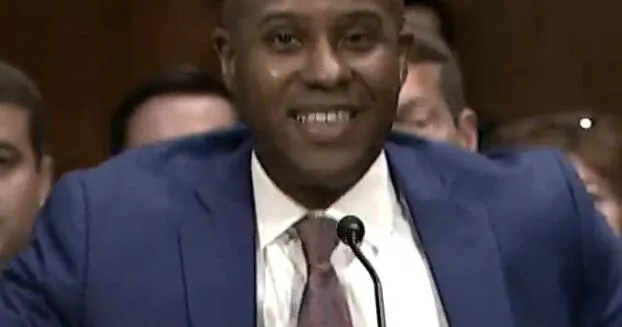
WASHINGTON – The U.S. Senate Judiciary Committee on Thursday morning recommended that the full Senate confirm two Louisiana lawyers nominated by President Joe Biden for federal judgeships in New Orleans and Alexandria.
U.S. Sen. John N. Kennedy, a Madisonville Republican who is a member of the panel, joined his mostly Democratic colleagues in supporting the confirmation of the two nominations, which both passed on 16-5 votes.
If confirmed by the full Senate, Jerry Edwards Jr. would be the first person of color to gain the lifetime appointment as a district judge in the Western District of Louisiana. He’d sit in Alexandria.
Brandon S. Long also was recommended by the committee, the final step before Senate confirmation, to become a district judge for the Eastern District of Louisiana. He’d sit in New Orleans.
The president’s nomination of Long and Edwards also drew support from Louisiana’s other senator, Bill Cassidy, of Baton Rouge, who like Kennedy is a Republican.
“Both are excellent nominees who have the qualifications, temperament and dedication to the rule of law to be exemplary federal judges,” Cassidy said Thursday. “I look forward to them being confirmed by the full Senate with overwhelming support.”
No date has been set for a vote by the full Senate. But it likely won’t happen until October or November, depending on whether the federal government shuts down on Oct. 1 because Congress can’t agree on how to fund the government’s operations.
U.S. Rep. Troy Carter of New Orleans, the Louisiana congressional delegation’s only Democratic member, said Thursday he still is against the nominations, which drew a rebuke from him and a handful of other members of the Congressional Black Caucus when Biden announced them in June.
He doesn’t oppose Long or Edwards – he said he’s sure they’ll make fine judges. But the procedures used to come up with those two names were too closed and should have included more names, Carter said.
He added that his opposition “is about a process that is flawed and we’re still working to correct that process. They were summarily leaving out qualified African American women, qualified African American lawyers who should be given an opportunity to be considered.”
Carter doesn’t get a vote on the nominations, but Louisiana’s two senators do. Either senator has the power to derail a confirmation.
Professor Carl Tobias, a University of Richmond School of Law who studies federal judicial nominations, agreed that a wide variety of interests should have input on who to nominate for the lifetime appointment. But in the realm of real politics, having both home-state senators on board pretty much guarantees confirmation. Long and Edwards are a good case in point – both should be easily confirmed in an atmosphere in which some Republican senators oppose all Biden nominations, he said.
After graduating from Duke University School of Law, Long, 47, went to work in 2005 for the King & Spalding law firm. In 2010, he joined the U.S. Attorney’s Office in Washington, D.C., where he tried 27 criminal cases.
He was detailed to the Federal Bureau of Investigation in 2020 after working six years for the U.S. Attorney’s Office in New Orleans. During two of those years, he was deputy chief of the narcotics unit.
Long was co-counsel in the investigation and prosecution of Irvin Mayfield, cofounder of the New Orleans Jazz Orchestra, and his business partner Ronald Markham, who went to prison for 18 months in 2020 after pleading guilty to siphoning $1.3 million from the New Orleans Public Library Foundation. In 2016, he also prosecuted retired Saints player Darren Sharper for using drugs to rape women. Sharper pleaded guilty and was sentenced to 220 months in prison.
Edwards, 44, would be the first Black trial judge to serve in the 42-parish U.S. Western District of Louisiana, which is divided into five divisions: Alexandria, Lafayette, Lake Charles, Monroe and Shreveport.
After graduating law school at the University of Vermont, he clerked for Judges Scott J. Crichton and Jeanette G. Garrett when both were on the state’s First Judicial District Court in Shreveport.
In 2006, Edwards went to work for the Blanchard, Walker, O’Quin & Roberts law firm in Shreveport, where he represented self-insured businesses, particularly Wal-Mart. Edwards joined the U.S. Attorney’s Office in Shreveport in 2019. He handled civil matters, such as employment disputes and challenges against federal agencies.
His extensive civil law experience was noted and questioned by Sen. Marsha Blackburn, R-Tennessee, who asked if he would be overwhelmed by the criminal cases federal judges also handle.
Edwards responded that being first assistant U.S. attorney, a position he assumed in Shreveport last year, required him to oversee prosecution of federal crimes, including cases of firearm and drug cases, gang violence, human trafficking, white collar crime, and public corruption.
As a private attorney he represented self-insured businesses in tort actions. Ninety-five percent of his experience has been trial work, 60% of it in federal courts, he said. He tried nine cases to verdict.


